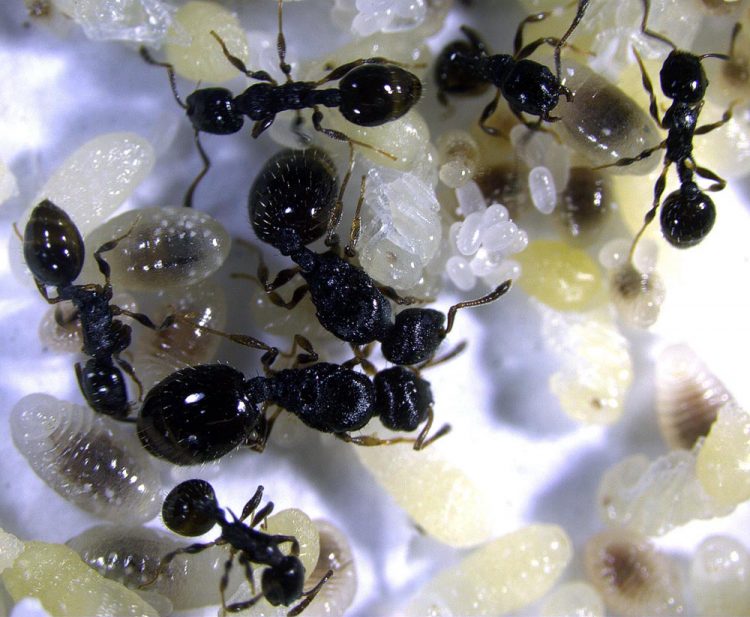Division of labor among social insects: All-rounders better cope with threats than specialists

Part of a colony of Temnothorax longispinosus with two queens, workers, and offspring in various stages of development photo/©: Susanne Foitzik
A characteristic of insect societies such as ants is the way tasks are distributed among group members. Not only queens and worker ants have clearly defined responsibilities but the workers themselves also have particular jobs to do when, for example, it comes to the care of the young, defense, and nest building activities. It is widely assumed that this division of labor is an essential factor that determines the success of such social groups. According to this view, a high degree of specialization provides advantages because the individual tasks are performed better and more effectively. It seems, however, that this advantage may actually be a great disadvantage in special circumstances. As researchers at Johannes Gutenberg University Mainz (JGU) have discovered, highly specialized ants lack the flexibility to adapt to new situations—with serious consequences for the entire colony.
“Our findings provide an explanation of why all-rounders tend to be ubiquitous and show how important they are for the flexibility and robustness of entire societies,” said evolutionary biologist Professor Susanne Foitzik, commenting on the latest findings of her research group at Mainz University. Foitzik and Evelien Jongepier investigated what happens when ant colonies with different degrees of specialization are exposed to an external threat. They tested around 3,800 ants of the species Temnothorax longispinosus and, based on their behavior, formed separate ant colonies consisting of either all-rounders or specialists. These colonies were then subjected to attacks by the slave-making ants Temnothorax americanus and as a consequence were forced to either flee or defend themselves. The social parasite T. americanus carries out raids on neighboring host colonies in order to steal their young, often killing adult worker ants and the queen in the process.
“In contrast with the widely held assumption that an individual specialization provides social advantages, we have found that specialization can in fact have a negative impact on the propagation and the chances of survival and growth of a colony,” summarized Jongepier, first author of the study. Ant colonies which were specialized in defense and the care of offspring lost almost 80 percent of their brood when attacked by slave-maker ants. All-rounders, in contrast, were able to save over half of their offspring. For a species such as T. longispinosus, which only reproduces once a year, such heavy brood losses can mean the virtual destruction of the colony or at least represent a serious threat to its future chances of survival. Such fitness costs associated with strict specialization mean that the all-rounder strategy probably has the better prospects of success in a natural environment with slave-makers. Ant communities living near to slave-makers are less highly specialized than colonies in areas which are free of these social parasites. “In the field, slave-makers represent an evolutionary factor that counteracts the development of higher levels of specialization,” clarified Foitzik.
Flexibility in behavior pays off
Discussing their findings, Foitzik and Jongepier postulate that specialized communities probably have difficulty in changing their activities and so they are less flexible. Even if the findings cannot be applied directly to other spheres, they nevertheless provide insights into the evolution of social groups and provide indications of their potential viability. “Our results show how important it is to take ecological aspects into account when organizing work and individual patterns of behavior if benefits for the whole society are to be obtained,” the researchers concluded. Thus, flexibility in behavior would be advantageous not only for ant colonies but also in connection with quite different organizational structures as well, especially when frequent disruptions are possible. These could range from metabolic cycles with all-rounder enzymes to financial systems that do not rely on just a few specialized institutions and are thus more stable.
Images:
http://www.uni-mainz.de/bilder_presse/10_zoologie_ameisen_generalisten_01.jpg
Part of a colony of Temnothorax longispinosus with two queens, workers, and offspring in various stages of development
photo/©: Susanne Foitzik
http://www.uni-mainz.de/bilder_presse/10_zoologie_ameisen_generalisten_02.jpg
Workers of the host species Temnothorax longispinosus fighting a slightly larger worker of the T. americanus slave-maker species that has invaded their colony
photo/©: Susanne Foitzik
http://www.uni-mainz.de/bilder_presse/10_zoologie_ameisen_generalisten_03.jpg
A T. americanus slave-maker worker ant (left) interacting with a slave worker of the species T. longispinosus (right)
photo/©: Susanne Foitzik
Publication:
Evelien Jongepier, Susanne Foitzik
Fitness costs of worker specialization for ant societies
Proceedings of the Royal Society B, 13 January 2016
DOI: 10.1098/rspb.2015.2572
Further information:
Professor Dr. Susanne Foitzik
Institute of Zoology – Evolutionary Biology
Johannes Gutenberg University Mainz (JGU)
55099 Mainz, GERMANY
phone +49 6131 39-27840
fax +49 6131 39-27850
E-mail: foitzik@uni-mainz.de
http://www.bio.uni-mainz.de/zoo/evobio/index_ENG.php
http://rspb.royalsocietypublishing.org/content/283/1822/20152572 (Article) ;
http://www.uni-mainz.de/presse/19919_ENG_HTML.php — press release “Parasitic tapeworm influences the behavior and lifespan of uninfected members of ant colonies”, 1 Dec. 2015
Media Contact
All latest news from the category: Life Sciences and Chemistry
Articles and reports from the Life Sciences and chemistry area deal with applied and basic research into modern biology, chemistry and human medicine.
Valuable information can be found on a range of life sciences fields including bacteriology, biochemistry, bionics, bioinformatics, biophysics, biotechnology, genetics, geobotany, human biology, marine biology, microbiology, molecular biology, cellular biology, zoology, bioinorganic chemistry, microchemistry and environmental chemistry.
Newest articles

First-of-its-kind study uses remote sensing to monitor plastic debris in rivers and lakes
Remote sensing creates a cost-effective solution to monitoring plastic pollution. A first-of-its-kind study from researchers at the University of Minnesota Twin Cities shows how remote sensing can help monitor and…

Laser-based artificial neuron mimics nerve cell functions at lightning speed
With a processing speed a billion times faster than nature, chip-based laser neuron could help advance AI tasks such as pattern recognition and sequence prediction. Researchers have developed a laser-based…

Optimising the processing of plastic waste
Just one look in the yellow bin reveals a colourful jumble of different types of plastic. However, the purer and more uniform plastic waste is, the easier it is to…



